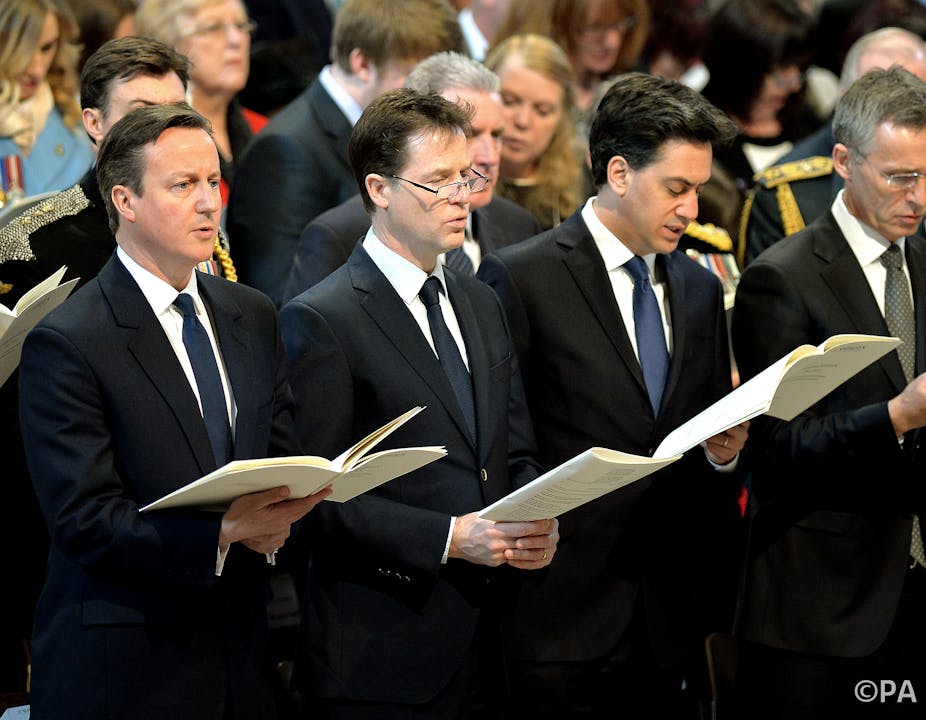The Conservative promise to hold a referendum on the UK’s European Union membership has been presented as a clear dividing line between the three main parties in the 2015 election campaign.
While the Conservatives, Labour and the Liberal Democrats would like voters to think there are clear blue waters between them on this issue, it’s really more of a muddy stream. In truth, the three parties agree on quite a lot about Europe.
The Conservatives have – and rightly deserve – a reputation for being strident Eurosceptics. We also know that the majority of the parliamentary party would love Britain to leave the EU tomorrow, but the pro-European credentials of Labour and the Liberal Democrats are sometimes found wanting too.
In order to spot the similarities between the parties, it is important to remember that British pro-Europeanism is of a “reformist”, even sceptic, variety.
Labour and the Liberal Democrats believe the UK should remain in the EU but they agonise about the nature of its role in the group. While in power, Labour ministers liked nothing more than to lecture Europeans on anything from waging wars to managing markets. These days, members of the Labour frontbench are unable to talk about the EU without using the word reform.
Even the Liberal Democrats, the most ardent British pro-European party often complain about the EU. They bemoan the red-tape, inefficiency, the Common Agricultural Policy and faint economic liberalism. For the Lib Dems, nothing in Europe is quite as good as it could be if everyone else stopped messing things up.
Funnily enough, these stances are extremely similar to what you might hear from the mouth of David Cameron. In the end, the three parties mostly disagree about methodology.
When David Cameron vetoed a motion to amend the Lisbon treaty at the 2011 European summit, Labour and the Liberal Democrats agreed with his rationale (which was defending the City) but attacked his modus operandi.

And when Cameron launched a very loud but totally ineffective campaign against the appointment of Jean-Claude Juncker as president of the European Commission, Labour and Liberal Democrats attacked Cameron’s tactics but admitted he was right.
The similarities do not end there. The three parties are all eager to be seen as responsive to voters’ concerns about EU immigration. Here too the differences between their approaches are minute. They disagree about the timeframe and the detail but all are essentially promising to restrict access to welfare for EU migrants.
Labour proposes withholding unemployment benefits from migrants who have been in the UK for less than two years. For the Tories, it should be four years. The Liberal Democrats have been slightly more generous by proposing a period of three months before EU migrants can access in-work benefits and two years before they can access social housing.
But none of the parties have yet explained how exactly they will deliver on this promise. The prime minister has admitted that some the changes he is proposing may require an EU treaty change but in the meantime he has neglected the task of building a coalition of support in the EU, which could make things difficult when he wants to negotiate Britain’s new terms of membership.
Likewise, Labour promises a more effective diplomatic offensive to negotiate the changes to the EU’s single market rules but seems to forget that the EU has 27 other member states. Work and Pensions shadow secretary Rachel Reeves went as far as to say she has had conversations with German, French and Irish officials who seemed to be supportive of Labour’s migration plans, forgetting that the governments in Tallinn or Warsaw may have a very different view on the matter.
For their part, the Liberal Democrats are relying on Nick Clegg’s multilingual skills and pro-European profile to deliver the goods, though across the Channel he is seen as too unimportant to matter.
And because delivering on promise will be challenging to say the least, in the next weeks, the Conservatives, Labour and the Liberal Democrats will try their best to either avoid the issue or to fudge it with equally misleading answers. It’s little wonder then that the smaller parties seem so keen to point out that these three do not offer any genuine choice.

